
Zero
Experience email the way you want with 0 – the first open source email app that puts your privacy and safety first (coming soon). Join the discord: https://discord.gg/0email
Stars: 4794

Zero is an open-source AI email solution that allows users to self-host their email app while integrating external services like Gmail. It aims to modernize and enhance emails through AI agents, offering features like open-source transparency, AI-driven enhancements, data privacy, self-hosting freedom, unified inbox, customizable UI, and developer-friendly extensibility. Built with modern technologies, Zero provides a reliable tech stack including Next.js, React, TypeScript, TailwindCSS, Node.js, Drizzle ORM, and PostgreSQL. Users can set up Zero using standard setup or Dev Container setup for VS Code users, with detailed environment setup instructions for Better Auth, Google OAuth, and optional GitHub OAuth. Database setup involves starting a local PostgreSQL instance, setting up database connection, and executing database commands for dependencies, tables, migrations, and content viewing.
README:
An Open-Source Gmail Alternative for the Future of Email
Zero is an open-source AI email solution that gives users the power to self-host their own email app while also integrating external services like Gmail and other email providers. Our goal is to modernize and improve emails through AI agents to truly modernize emails.
Most email services today are either closed-source, data-hungry, or too complex to self-host. 0.email is different:
- ✅ Open-Source – No hidden agendas, fully transparent.
- 🦾 AI Driven - Enhance your emails with Agents & LLMs.
- 🔒 Data Privacy First – Your emails, your data. No tracking, no selling, no middlemen.
- ⚙️ Self-Hosting Freedom – Run your own email app with ease.
- 📬 Unified Inbox – Connect multiple email providers like Gmail, Outlook, and more.
- 🎨 Customizable UI & Features – Tailor your email experience the way you want it.
- 🚀 Developer-Friendly – Built with extensibility and integrations in mind.
Zero is built with modern and reliable technologies:
- Frontend: Next.js, React, TypeScript, TailwindCSS, Shadcn UI
- Backend: Node.js, Drizzle ORM
- Database: PostgreSQL
- Authentication: Better Auth, Google OAuth
Required Versions:
Before running the application, you'll need to set up services and configure environment variables. For more details on environment variables, see the Environment Variables section.
You can set up Zero in two ways:
Option 1: Standard Setup (Recommended)
-
Clone and Install
# Clone the repository git clone https://github.com/Mail-0/Zero.git cd Zero # Install dependencies bun install # Install database dependencies bun db:dependencies # Start database locally bun docker:up
-
Set Up Environment
- Copy
.env.exampleto.envin bothapps/mailandpackages/dbfolderscp apps/mail/.env.example apps/mail/.env && cp packages/db/.env.example packages/db/.env - Configure your environment variables (see below)
- Install database dependencies:
bun db:dependencies - Initialize the database:
bun db:push
- Copy
-
Start the App
bun dev
-
Open in Browser
Visit http://localhost:3000
Option 2: Dev Container Setup (For VS Code Users)
This option uses VS Code's Dev Containers feature to provide a fully configured development environment with all dependencies pre-installed. It's great for ensuring everyone on the team has the same setup.
-
Prerequisites
- Docker
- VS Code or compatible editor
- Dev Containers extension
-
Open in Dev Container
- Clone the repository:
git clone https://github.com/Mail-0/Zero.git - Open the folder in VS Code
- When prompted, click "Reopen in Container" or run the "Dev Containers: Open Folder in Container" command
- VS Code will build and start the dev container (this may take a few minutes the first time)
- Clone the repository:
-
Access the App
- The app will be available at http://localhost:3000
-
Troubleshooting
- If you encounter issues with the container, try rebuilding it using the "Dev Containers: Rebuild Container" command
- For dependency issues inside the container:
bash rm -rf node_modules rm bun.lockb bun install
-
Better Auth Setup
-
Open the
.envfile and change the BETTER_AUTH_SECRET to a random string. (Useopenssl rand -hex 32to generate a 32 character string)BETTER_AUTH_SECRET=your_secret_key
-
-
Google OAuth Setup (Required for Gmail integration)
-
Go to Google Cloud Console
-
Create a new project
-
Add the following APIs in your Google Cloud Project: People API, Gmail API
- Use the links above and click 'Enable' or
- Go to 'APIs and Services' > 'Enable APIs and Services' > Search for 'Google People API' and click 'Enable'
- Go to 'APIs and Services' > 'Enable APIs and Services' > Search for 'Gmail API' and click 'Enable'
-
Enable the Google OAuth2 API
-
Create OAuth 2.0 credentials (Web application type)
-
Add authorized redirect URIs:
- Development:
http://localhost:3000/api/auth/callback/googlehttp://localhost:3000/api/v1/mail/auth/google/callback
- Production:
https://your-production-url/api/auth/callback/googlehttps://your-production-url/api/v1/mail/auth/google/callback
- Development:
-
Add to
.env:GOOGLE_CLIENT_ID=your_client_id GOOGLE_CLIENT_SECRET=your_client_secret GOOGLE_REDIRECT_URI=http://localhost:3000/api/v1/mail/auth/google/callback
-
Add yourself as a test user:
- Go to
Audience - Under 'Test users' click 'Add Users'
- Add your email and click 'Save'
- Go to
-
[!WARNING] The
GOOGLE_REDIRECT_URImust match exactly what you configure in the Google Cloud Console, including the protocol (http/https), domain, and path - these are provided above.
-
GitHub OAuth Setup (Optional)
Click to expand GitHub OAuth setup instructions
-
Go to GitHub Developer Setting
-
Create a new OAuth App
-
Add authorized redirect URIs:
- Development:
http://localhost:3000/api/auth/callback/github - Production:
https://your-production-url/api/auth/callback/github
- Development:
-
Add to
.env:GITHUB_CLIENT_ID=your_client_id GITHUB_CLIENT_SECRET=your_client_secret
-
Copy .env.example located in the apps/mail folder to .env in the same folder and configure the following variables:
# Auth
BETTER_AUTH_SECRET= # Required: Secret key for authentication
# Google OAuth (Required for Gmail integration)
GOOGLE_CLIENT_ID= # Required for Gmail integration
GOOGLE_CLIENT_SECRET= # Required for Gmail integration
GOOGLE_REDIRECT_URI= # Required for Gmail integration
# GitHub OAuth (Optional)
GITHUB_CLIENT_ID= # Optional: For GitHub authentication
GITHUB_CLIENT_SECRET= # Optional: For GitHub authentication
# Database
DATABASE_URL= # Required: PostgreSQL connection string for backend connection
# Redis
REDIS_URL= # Redis URL for caching (http://localhost:8079 for local dev)
REDIS_TOKEN= # Redis token (upstash-local-token for local dev)To be able to run bun db:push and push the schemas to the database you also have to add a .env file to the packages/db folder (so packages/db/.env) with the following content:
DATABASE_URL= # Required: PostgreSQL connection string for migrationsFor local development a connection string example is provided in the .env.example file located in the same folder as the database.
Note: The DATABASE_URL connection string in the apps/mail/.env has to be the same as the one in packages/db/.env
Zero uses PostgreSQL for storing data. Here's how to set it up:
-
Start the Database
Run this command to start a local PostgreSQL instance:
bun docker:up
This creates a database with:
- Name:
zerodotemail - Username:
postgres - Password:
postgres - Port:
5432
- Name:
-
Set Up Database Connection
Make sure your database connection string is in:
apps/mail/.envpackages/db/.env
For local development use:
DATABASE_URL="postgresql://postgres:postgres@localhost:5432/zerodotemail" -
Database Commands
-
Install database dependencies:
bun db:dependencies
-
Set up database tables:
bun db:push
-
Create migration files (after schema changes):
bun db:generate
-
Apply migrations:
bun db:migrate
-
View database content:
bun db:studio
-
Please refer to the contributing guide.
If you'd like to help with translating Zero to other languages, check out our translation guide.
Curious who makes Zero? Here are our contributors and maintainers
For Tasks:
Click tags to check more tools for each tasksFor Jobs:
Alternative AI tools for Zero
Similar Open Source Tools

Zero
Zero is an open-source AI email solution that allows users to self-host their email app while integrating external services like Gmail. It aims to modernize and enhance emails through AI agents, offering features like open-source transparency, AI-driven enhancements, data privacy, self-hosting freedom, unified inbox, customizable UI, and developer-friendly extensibility. Built with modern technologies, Zero provides a reliable tech stack including Next.js, React, TypeScript, TailwindCSS, Node.js, Drizzle ORM, and PostgreSQL. Users can set up Zero using standard setup or Dev Container setup for VS Code users, with detailed environment setup instructions for Better Auth, Google OAuth, and optional GitHub OAuth. Database setup involves starting a local PostgreSQL instance, setting up database connection, and executing database commands for dependencies, tables, migrations, and content viewing.
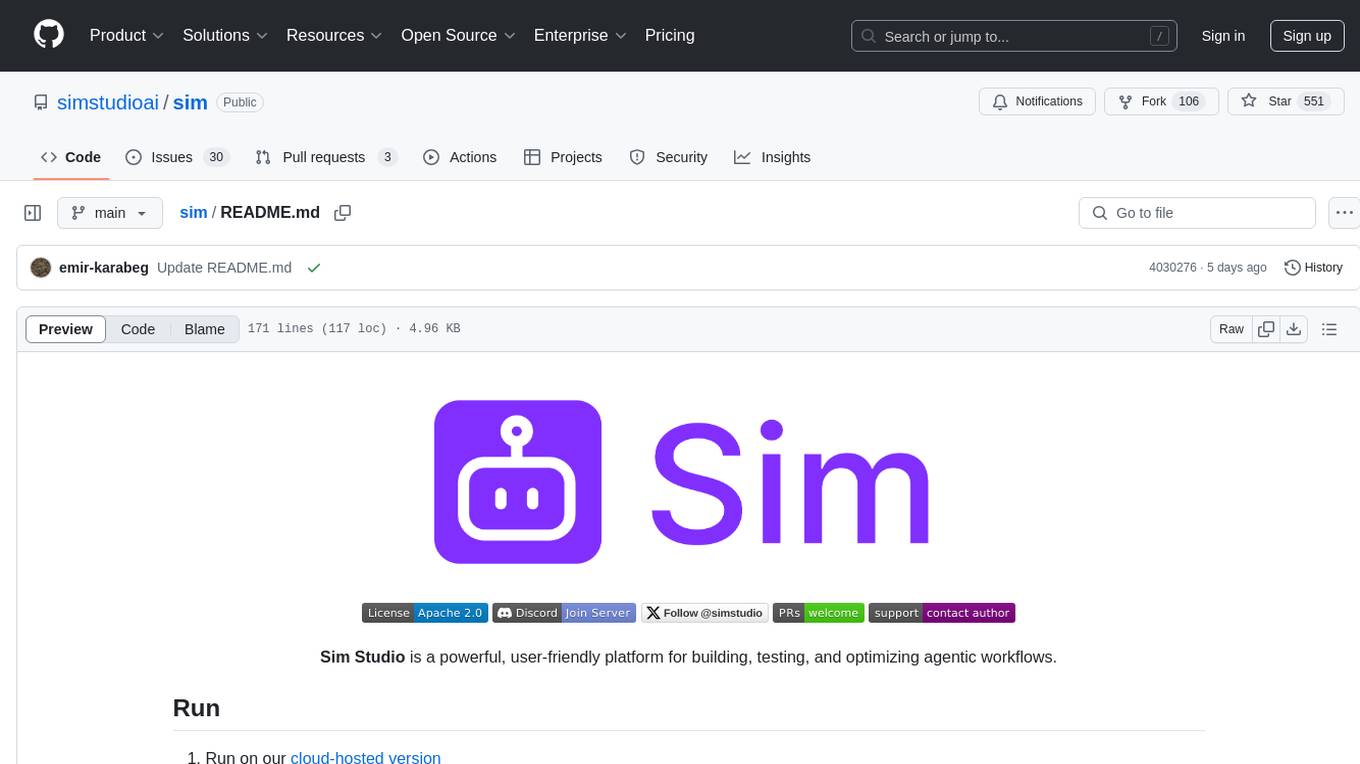
sim
Sim is a platform that allows users to build and deploy AI agent workflows quickly and easily. It provides cloud-hosted and self-hosted options, along with support for local AI models. Users can set up the application using Docker Compose, Dev Containers, or manual setup with PostgreSQL and pgvector extension. The platform utilizes technologies like Next.js, Bun, PostgreSQL with Drizzle ORM, Better Auth for authentication, Shadcn and Tailwind CSS for UI, Zustand for state management, ReactFlow for flow editor, Fumadocs for documentation, Turborepo for monorepo management, Socket.io for real-time communication, and Trigger.dev for background jobs.
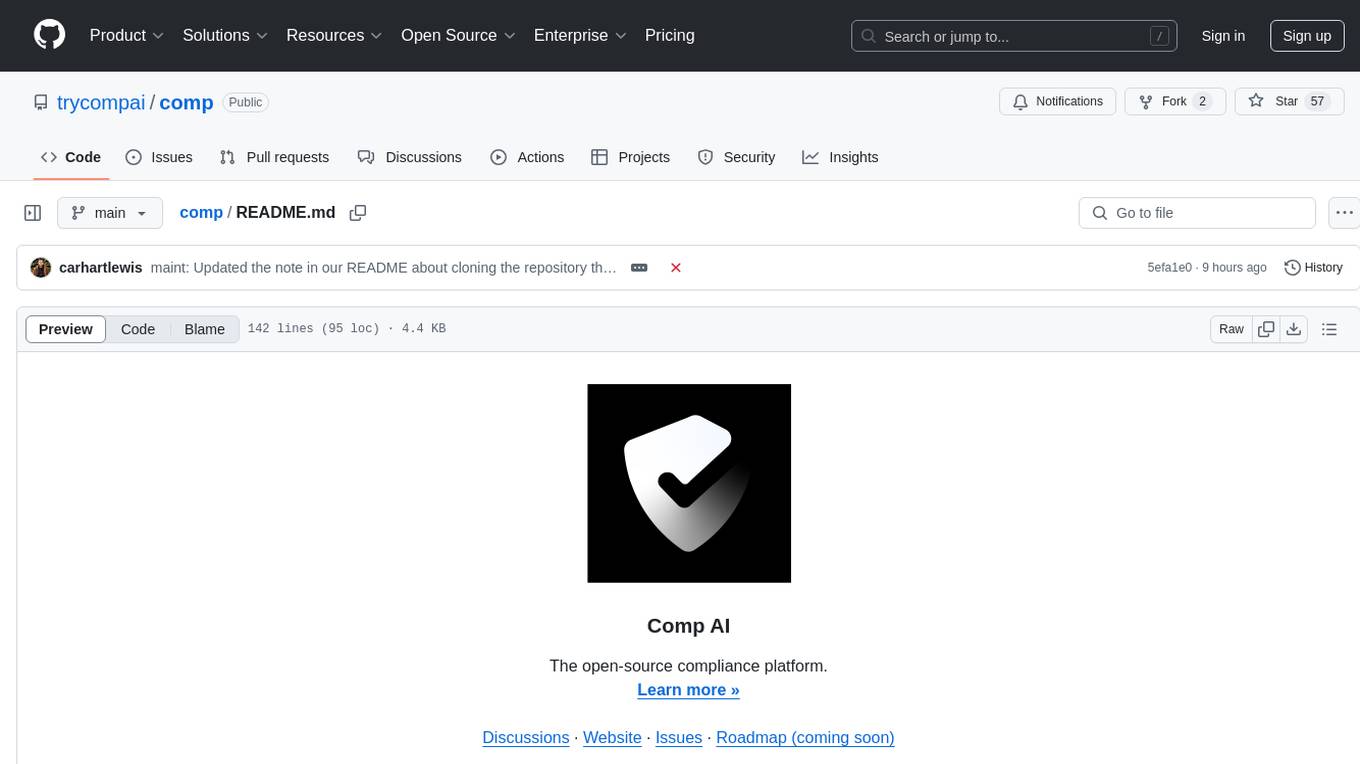
comp
Comp AI is an open-source compliance automation platform designed to assist companies in achieving compliance with standards like SOC 2, ISO 27001, and GDPR. It transforms compliance into an engineering problem solved through code, automating evidence collection, policy management, and control implementation while maintaining data and infrastructure control.
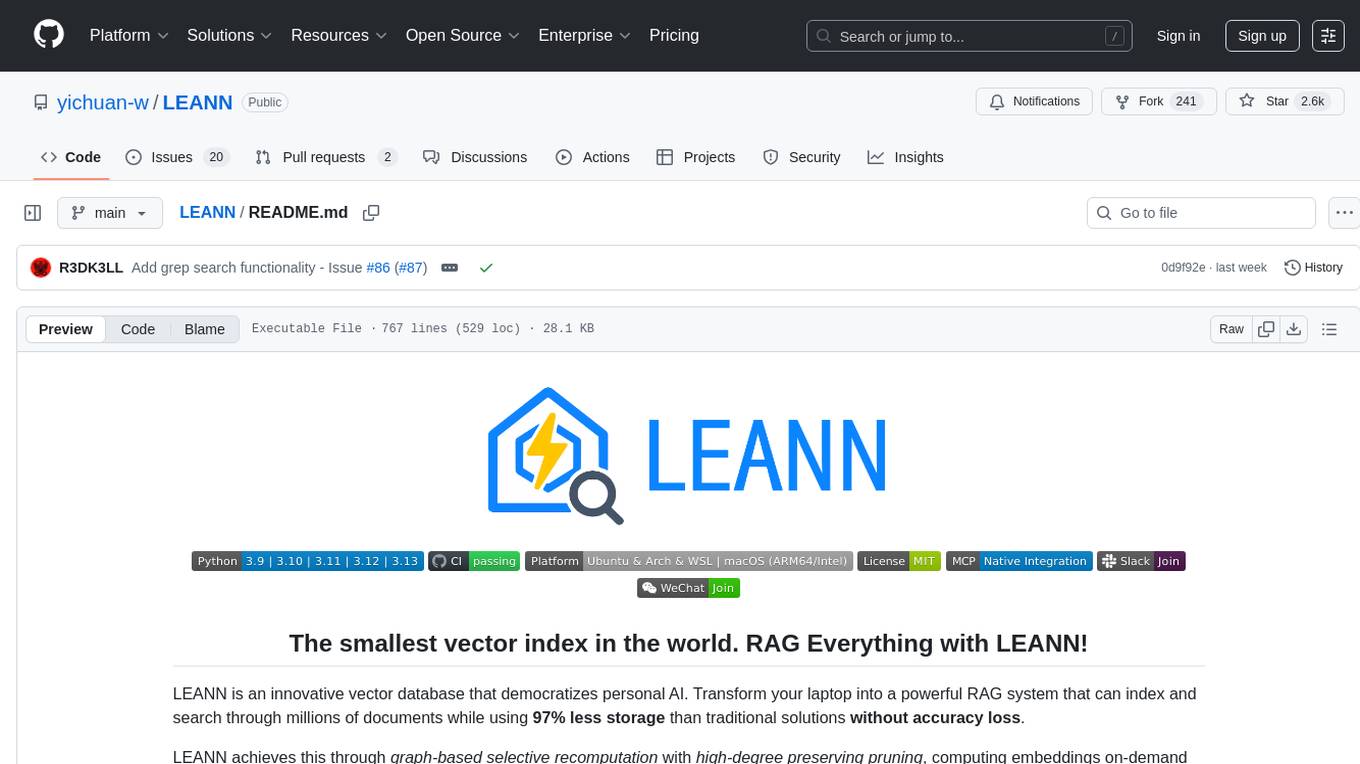
LEANN
LEANN is an innovative vector database that democratizes personal AI, transforming your laptop into a powerful RAG system that can index and search through millions of documents using 97% less storage than traditional solutions without accuracy loss. It achieves this through graph-based selective recomputation and high-degree preserving pruning, computing embeddings on-demand instead of storing them all. LEANN allows semantic search of file system, emails, browser history, chat history, codebase, or external knowledge bases on your laptop with zero cloud costs and complete privacy. It is a drop-in semantic search MCP service fully compatible with Claude Code, enabling intelligent retrieval without changing your workflow.
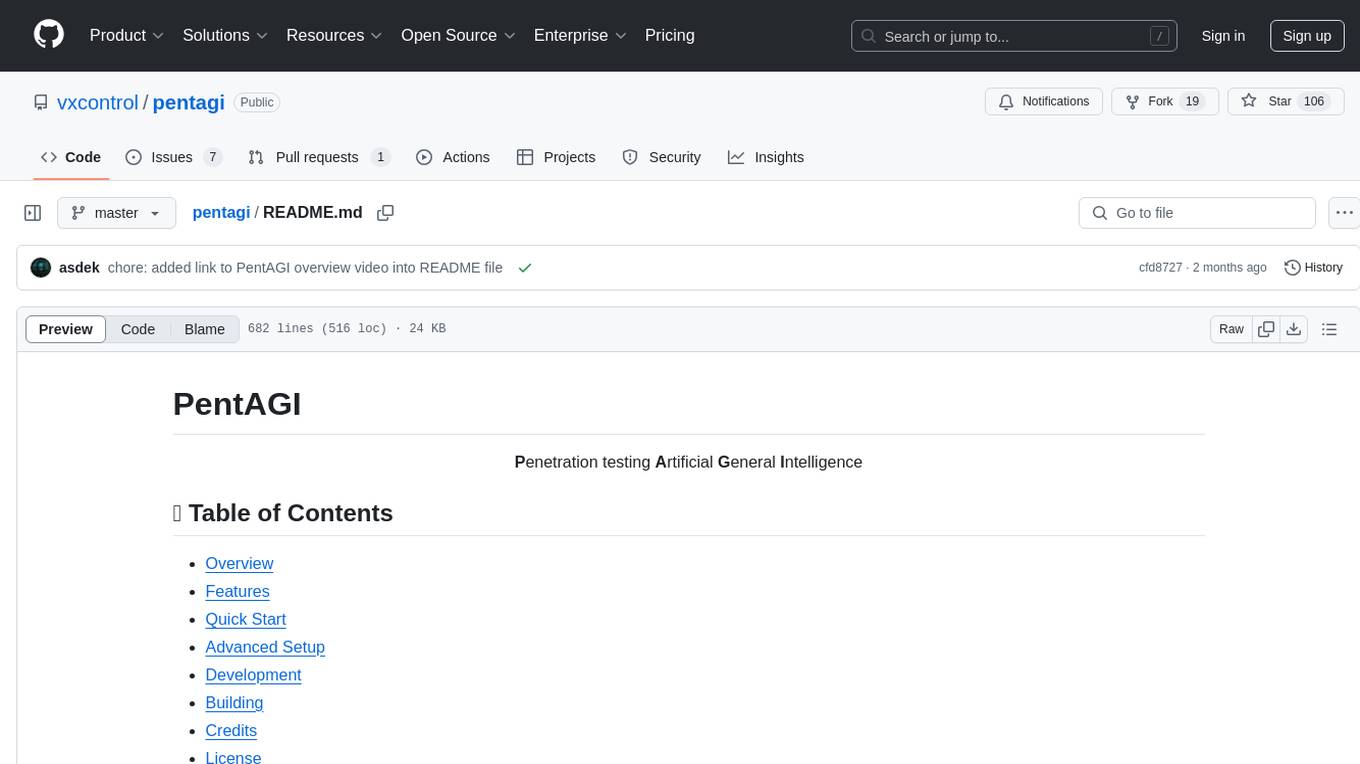
pentagi
PentAGI is an innovative tool for automated security testing that leverages cutting-edge artificial intelligence technologies. It is designed for information security professionals, researchers, and enthusiasts who need a powerful and flexible solution for conducting penetration tests. The tool provides secure and isolated operations in a sandboxed Docker environment, fully autonomous AI-powered agent for penetration testing steps, a suite of 20+ professional security tools, smart memory system for storing research results, web intelligence for gathering information, integration with external search systems, team delegation system, comprehensive monitoring and reporting, modern interface, API integration, persistent storage, scalable architecture, self-hosted solution, flexible authentication, and quick deployment through Docker Compose.
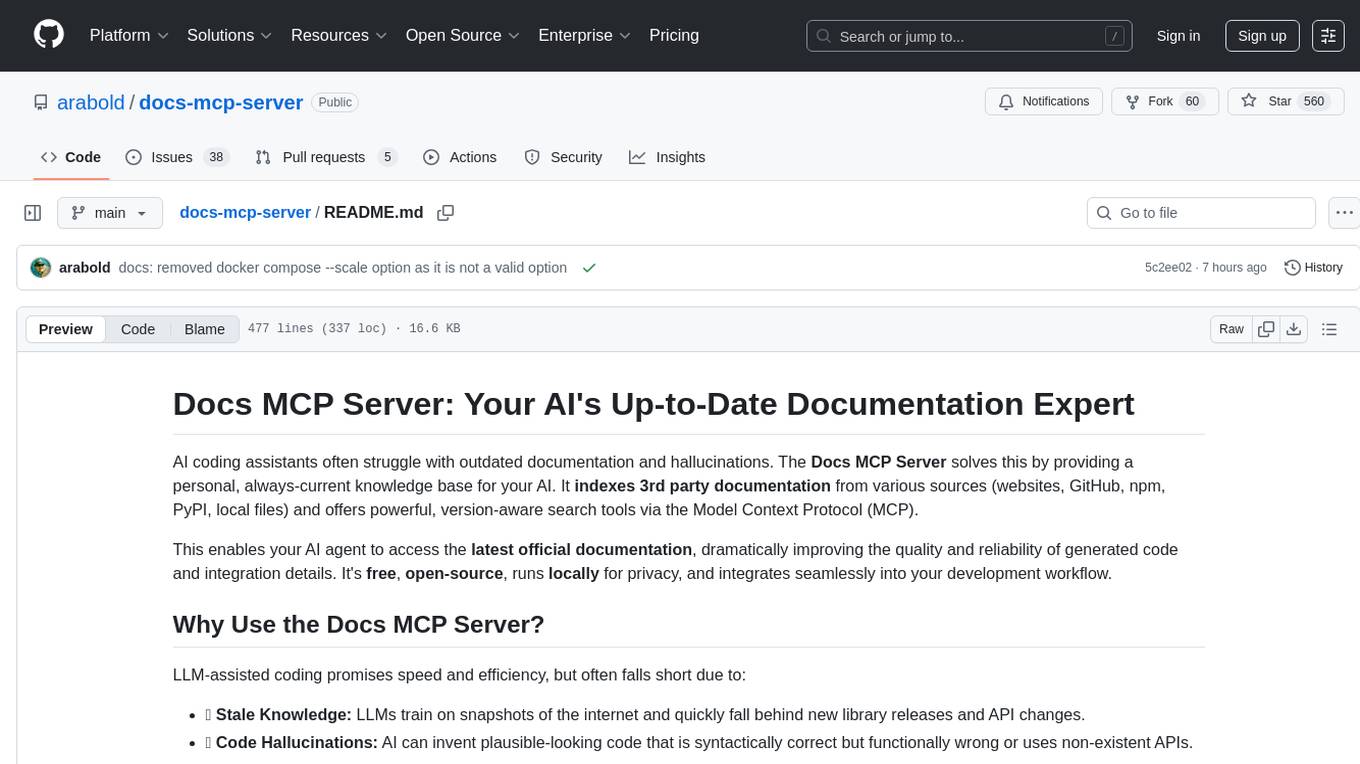
docs-mcp-server
The docs-mcp-server repository contains the server-side code for the documentation management system. It provides functionalities for managing, storing, and retrieving documentation files. Users can upload, update, and delete documents through the server. The server also supports user authentication and authorization to ensure secure access to the documentation system. Additionally, the server includes APIs for integrating with other systems and tools, making it a versatile solution for managing documentation in various projects and organizations.
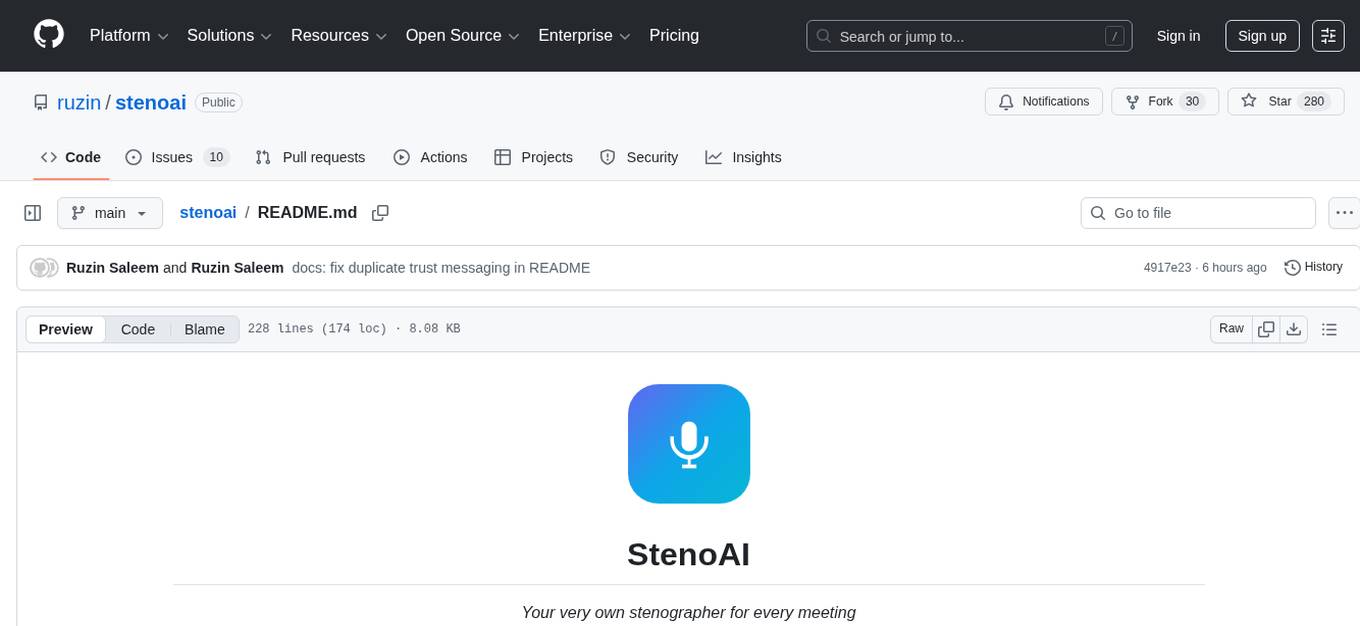
stenoai
StenoAI is an AI-powered meeting intelligence tool that allows users to record, transcribe, summarize, and query meetings using local AI models. It prioritizes privacy by processing data entirely on the user's device. The tool offers multiple AI models optimized for different use cases, making it ideal for healthcare, legal, and finance professionals with confidential data needs. StenoAI also features a macOS desktop app with a user-friendly interface, making it convenient for users to access its functionalities. The project is open-source and not affiliated with any specific company, emphasizing its focus on meeting-notes productivity and community collaboration.
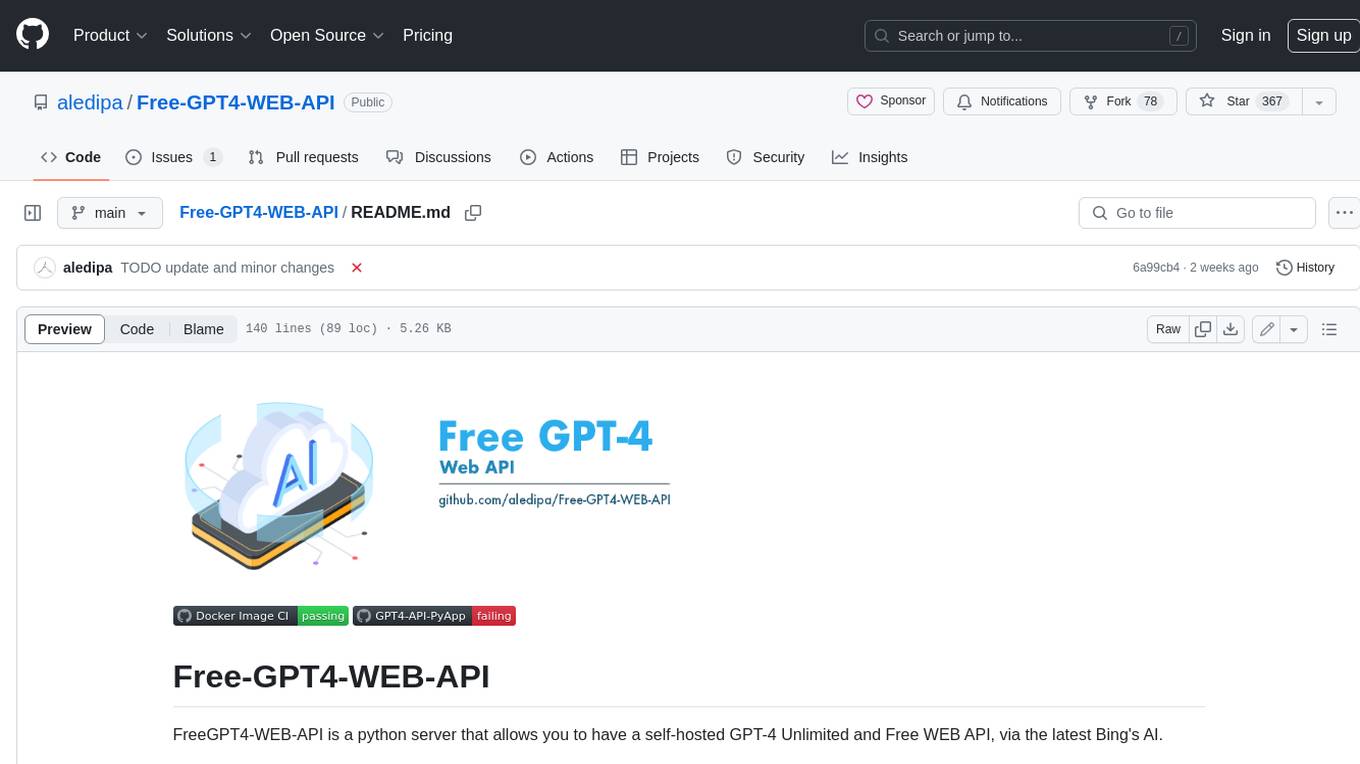
Free-GPT4-WEB-API
FreeGPT4-WEB-API is a Python server that allows you to have a self-hosted GPT-4 Unlimited and Free WEB API, via the latest Bing's AI. It uses Flask and GPT4Free libraries. GPT4Free provides an interface to the Bing's GPT-4. The server can be configured by editing the `FreeGPT4_Server.py` file. You can change the server's port, host, and other settings. The only cookie needed for the Bing model is `_U`.
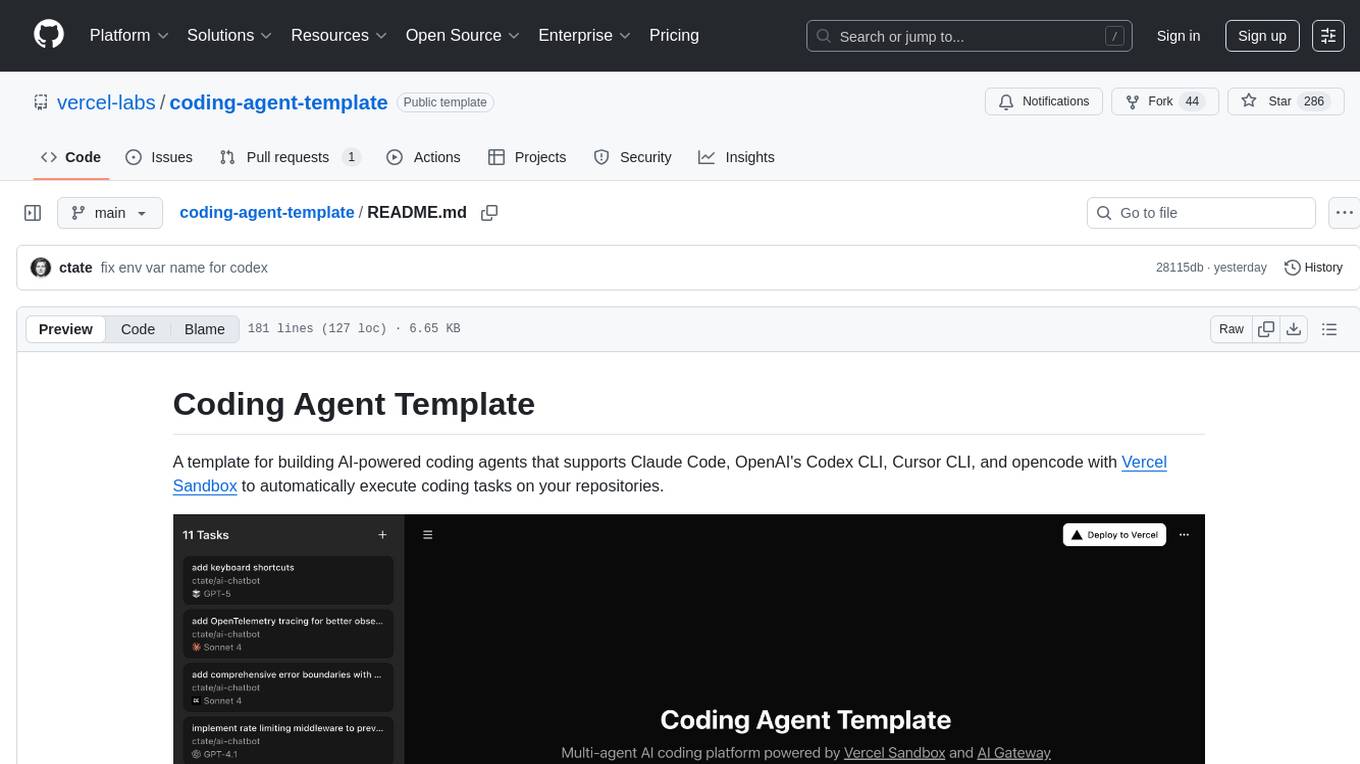
coding-agent-template
Coding Agent Template is a versatile tool for building AI-powered coding agents that support various coding tasks using Claude Code, OpenAI's Codex CLI, Cursor CLI, and opencode with Vercel Sandbox. It offers features like multi-agent support, Vercel Sandbox for secure code execution, AI Gateway integration, AI-generated branch names, task management, persistent storage, Git integration, and a modern UI built with Next.js and Tailwind CSS. Users can easily deploy their own version of the template to Vercel and set up the tool by cloning the repository, installing dependencies, configuring environment variables, setting up the database, and starting the development server. The tool simplifies the process of creating tasks, monitoring progress, reviewing results, and managing tasks, making it ideal for developers looking to automate coding tasks with AI agents.

openai-kotlin
OpenAI Kotlin API client is a Kotlin client for OpenAI's API with multiplatform and coroutines capabilities. It allows users to interact with OpenAI's API using Kotlin programming language. The client supports various features such as models, chat, images, embeddings, files, fine-tuning, moderations, audio, assistants, threads, messages, and runs. It also provides guides on getting started, chat & function call, file source guide, and assistants. Sample apps are available for reference, and troubleshooting guides are provided for common issues. The project is open-source and licensed under the MIT license, allowing contributions from the community.
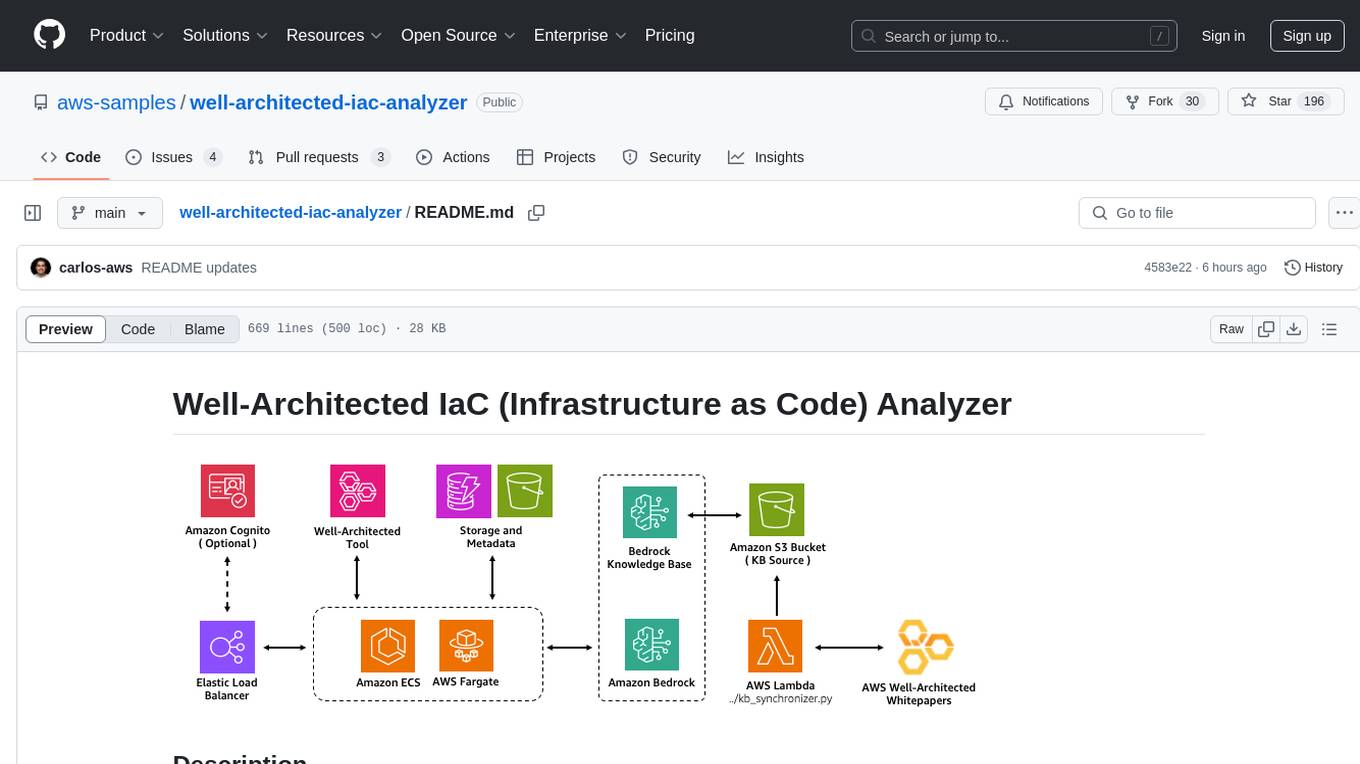
well-architected-iac-analyzer
Well-Architected Infrastructure as Code (IaC) Analyzer is a project demonstrating how generative AI can evaluate infrastructure code for alignment with best practices. It features a modern web application allowing users to upload IaC documents, complete IaC projects, or architecture diagrams for assessment. The tool provides insights into infrastructure code alignment with AWS best practices, offers suggestions for improving cloud architecture designs, and can generate IaC templates from architecture diagrams. Users can analyze CloudFormation, Terraform, or AWS CDK templates, architecture diagrams in PNG or JPEG format, and complete IaC projects with supporting documents. Real-time analysis against Well-Architected best practices, integration with AWS Well-Architected Tool, and export of analysis results and recommendations are included.
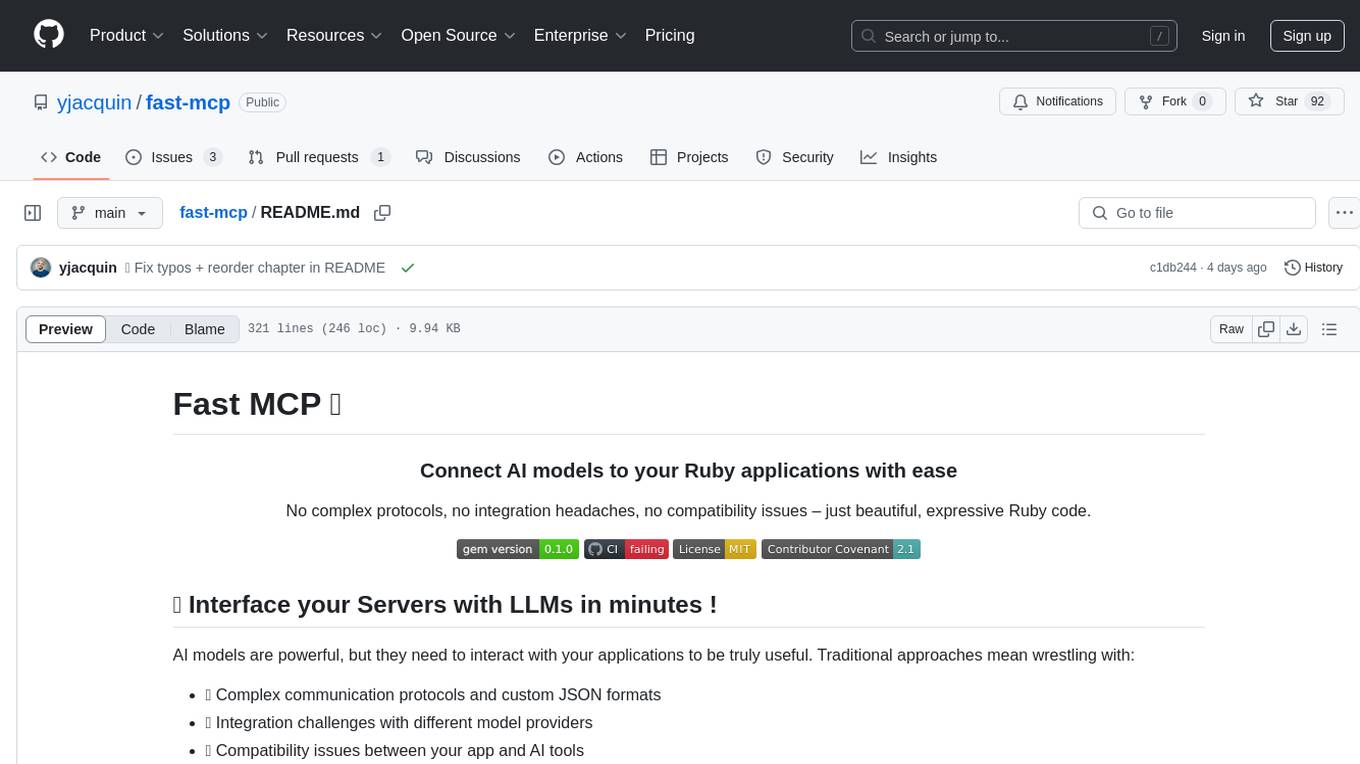
fast-mcp
Fast MCP is a Ruby gem that simplifies the integration of AI models with your Ruby applications. It provides a clean implementation of the Model Context Protocol, eliminating complex communication protocols, integration challenges, and compatibility issues. With Fast MCP, you can easily connect AI models to your servers, share data resources, choose from multiple transports, integrate with frameworks like Rails and Sinatra, and secure your AI-powered endpoints. The gem also offers real-time updates and authentication support, making AI integration a seamless experience for developers.
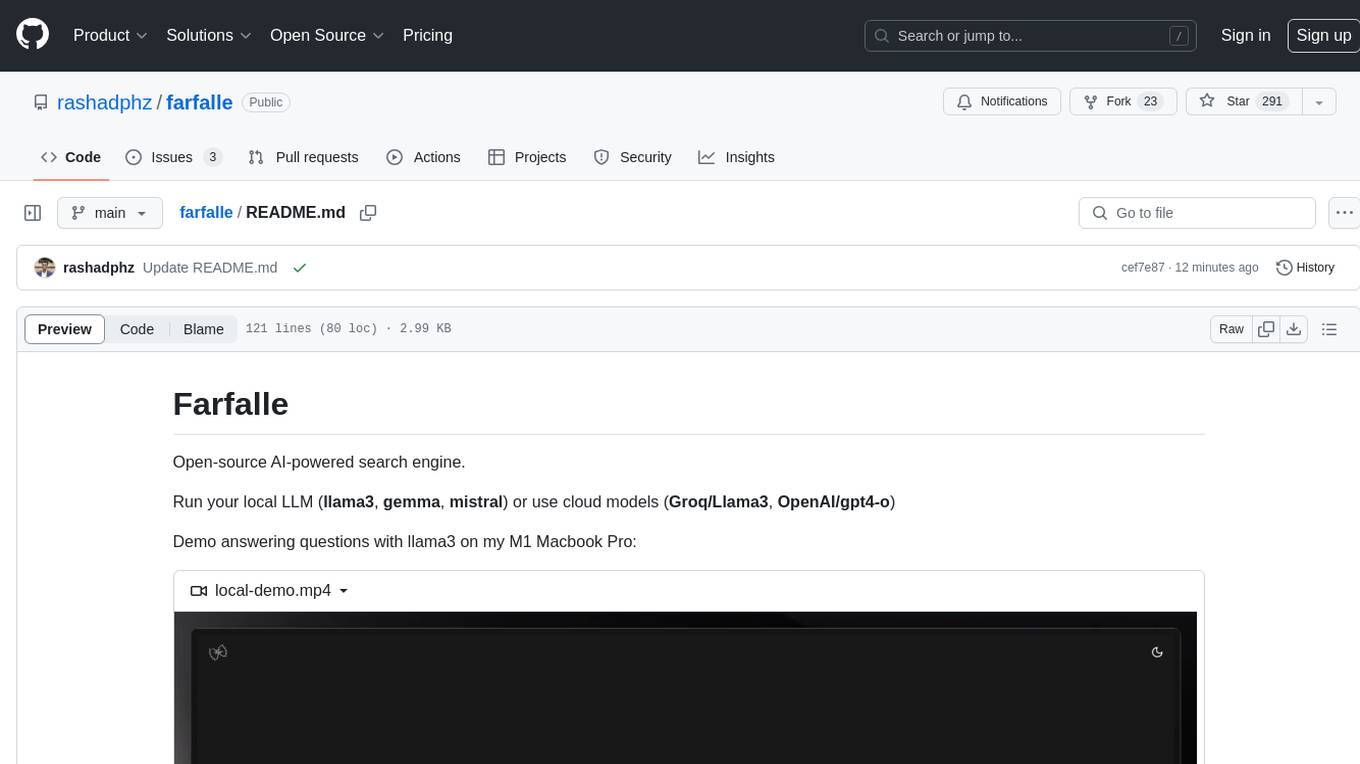
farfalle
Farfalle is an open-source AI-powered search engine that allows users to run their own local LLM or utilize the cloud. It provides a tech stack including Next.js for frontend, FastAPI for backend, Tavily for search API, Logfire for logging, and Redis for rate limiting. Users can get started by setting up prerequisites like Docker and Ollama, and obtaining API keys for Tavily, OpenAI, and Groq. The tool supports models like llama3, mistral, and gemma. Users can clone the repository, set environment variables, run containers using Docker Compose, and deploy the backend and frontend using services like Render and Vercel.
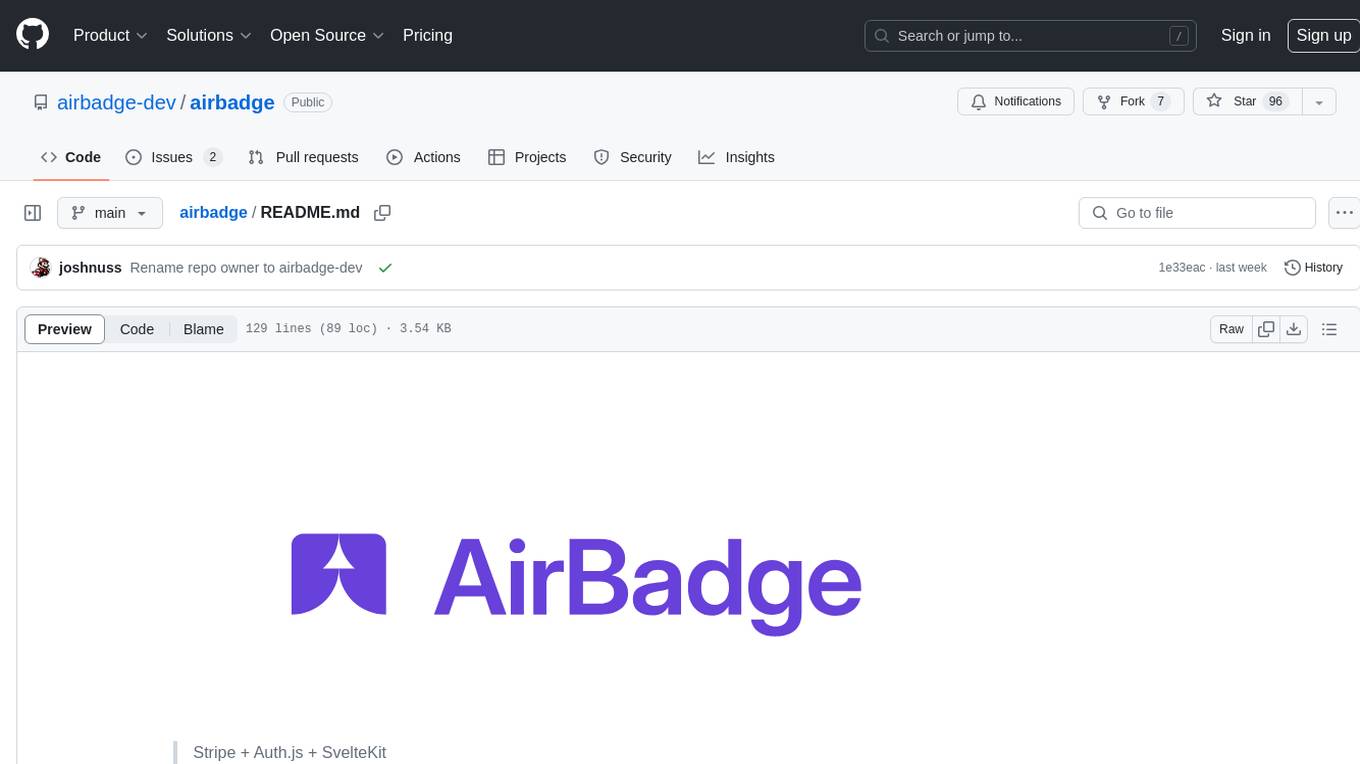
airbadge
Airbadge is a Stripe addon for Auth.js that simplifies the process of creating a SaaS site by integrating payment, authentication, gating, self-service account management, webhook handling, trials & free plans, session data, and more. It allows users to launch a SaaS app without writing any authentication or payment code. The project is open source and free to use with optional paid features under the BSL License.
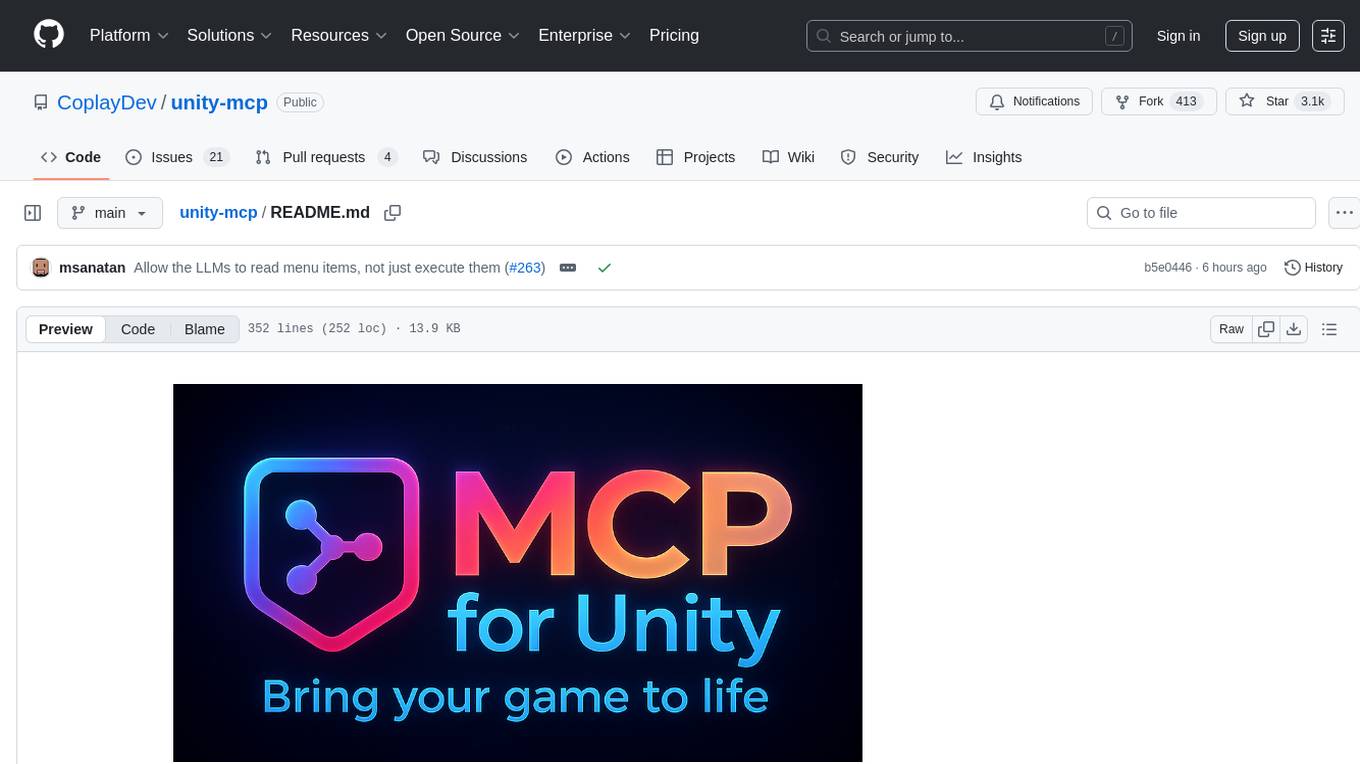
unity-mcp
MCP for Unity is a tool that acts as a bridge, enabling AI assistants to interact with the Unity Editor via a local MCP Client. Users can instruct their LLM to manage assets, scenes, scripts, and automate tasks within Unity. The tool offers natural language control, powerful tools for asset management, scene manipulation, and automation of workflows. It is extensible and designed to work with various MCP Clients, providing a range of functions for precise text edits, script management, GameObject operations, and more.
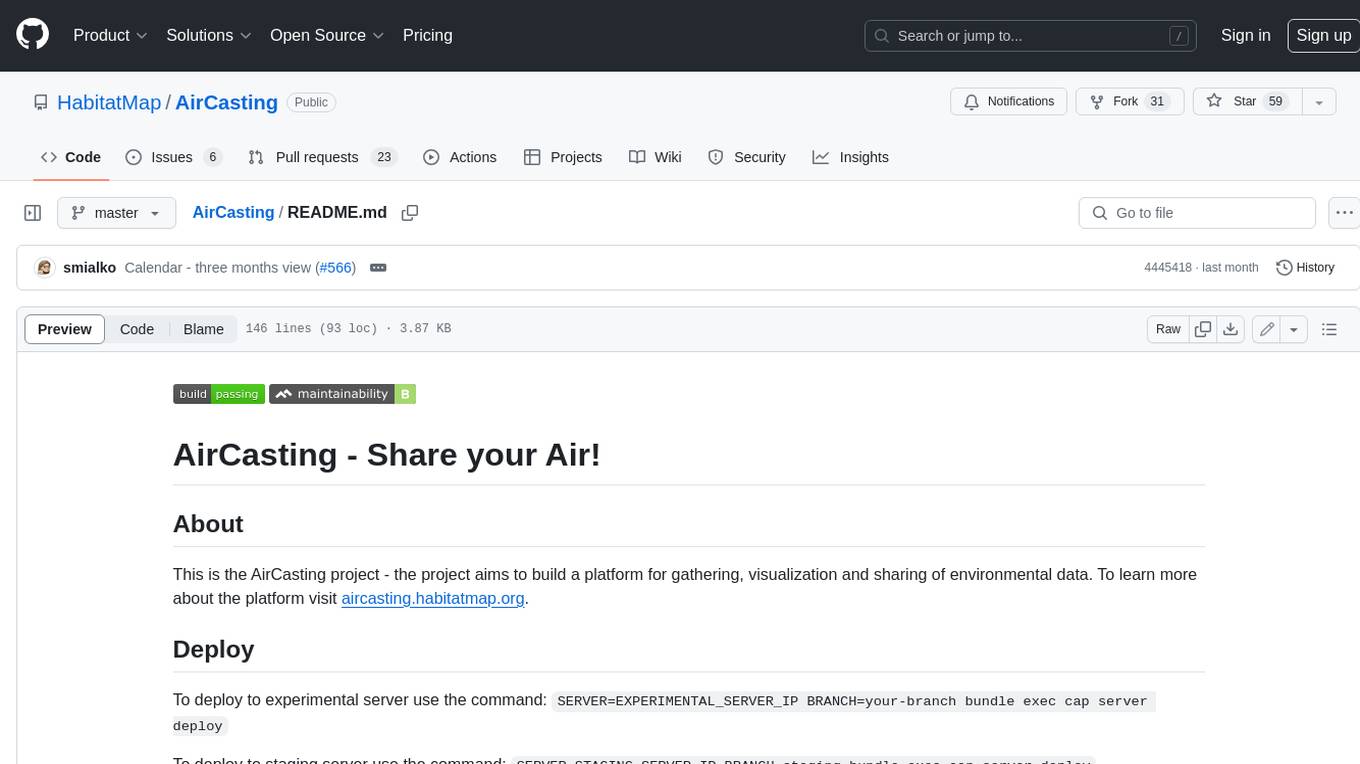
AirCasting
AirCasting is a platform for gathering, visualizing, and sharing environmental data. It aims to provide a central hub for environmental data, making it easier for people to access and use this information to make informed decisions about their environment.
For similar tasks

Zero
Zero is an open-source AI email solution that allows users to self-host their email app while integrating external services like Gmail. It aims to modernize and enhance emails through AI agents, offering features like open-source transparency, AI-driven enhancements, data privacy, self-hosting freedom, unified inbox, customizable UI, and developer-friendly extensibility. Built with modern technologies, Zero provides a reliable tech stack including Next.js, React, TypeScript, TailwindCSS, Node.js, Drizzle ORM, and PostgreSQL. Users can set up Zero using standard setup or Dev Container setup for VS Code users, with detailed environment setup instructions for Better Auth, Google OAuth, and optional GitHub OAuth. Database setup involves starting a local PostgreSQL instance, setting up database connection, and executing database commands for dependencies, tables, migrations, and content viewing.
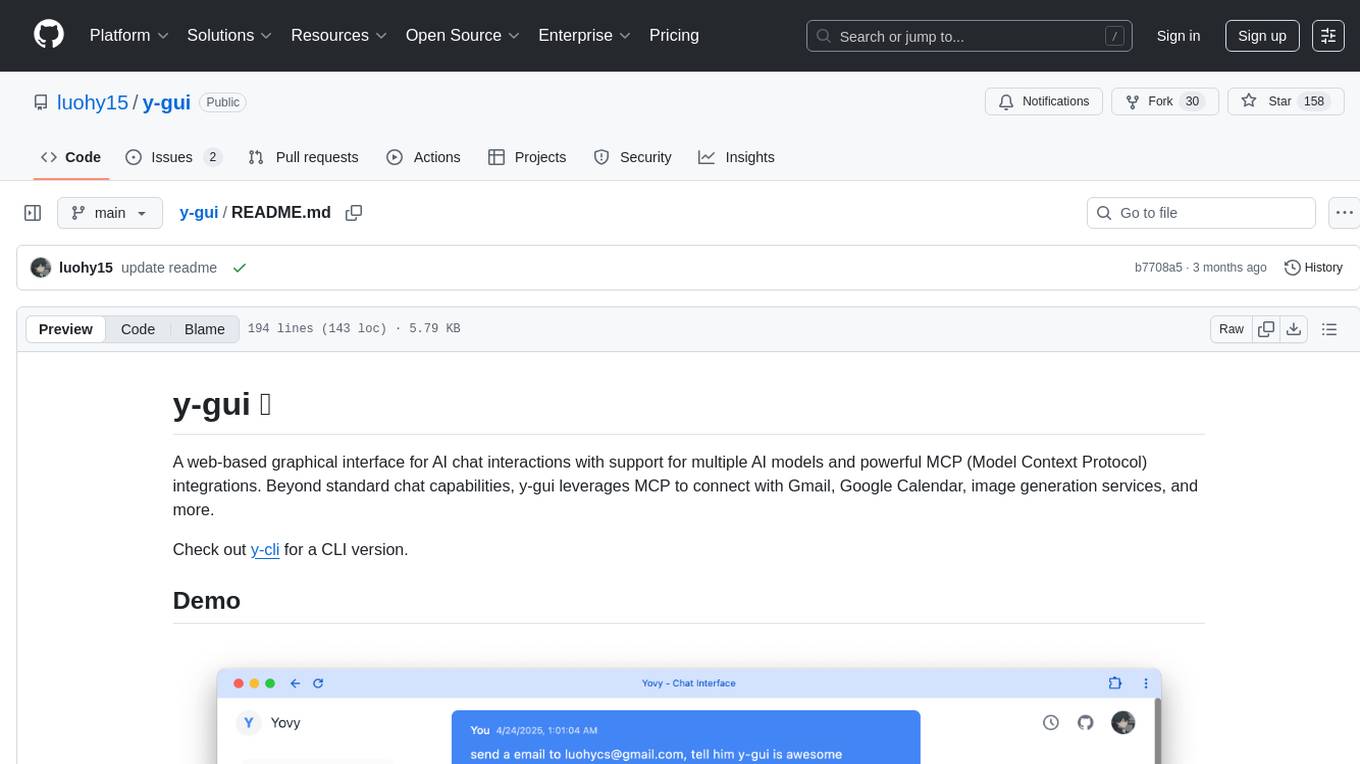
y-gui
y-gui is a web-based graphical interface for AI chat interactions with support for multiple AI models and powerful MCP integrations. It provides interactive chat capabilities with AI models, supports multiple bot configurations, and integrates with Gmail, Google Calendar, and image generation services. The tool offers a comprehensive MCP integration system, secure authentication with Auth0 and Google login, dark/light theme support, real-time updates, and responsive design for all devices. The architecture consists of a frontend React application and a backend Cloudflare Workers with D1 storage. It allows users to manage emails, create calendar events, and generate images directly within chat conversations.
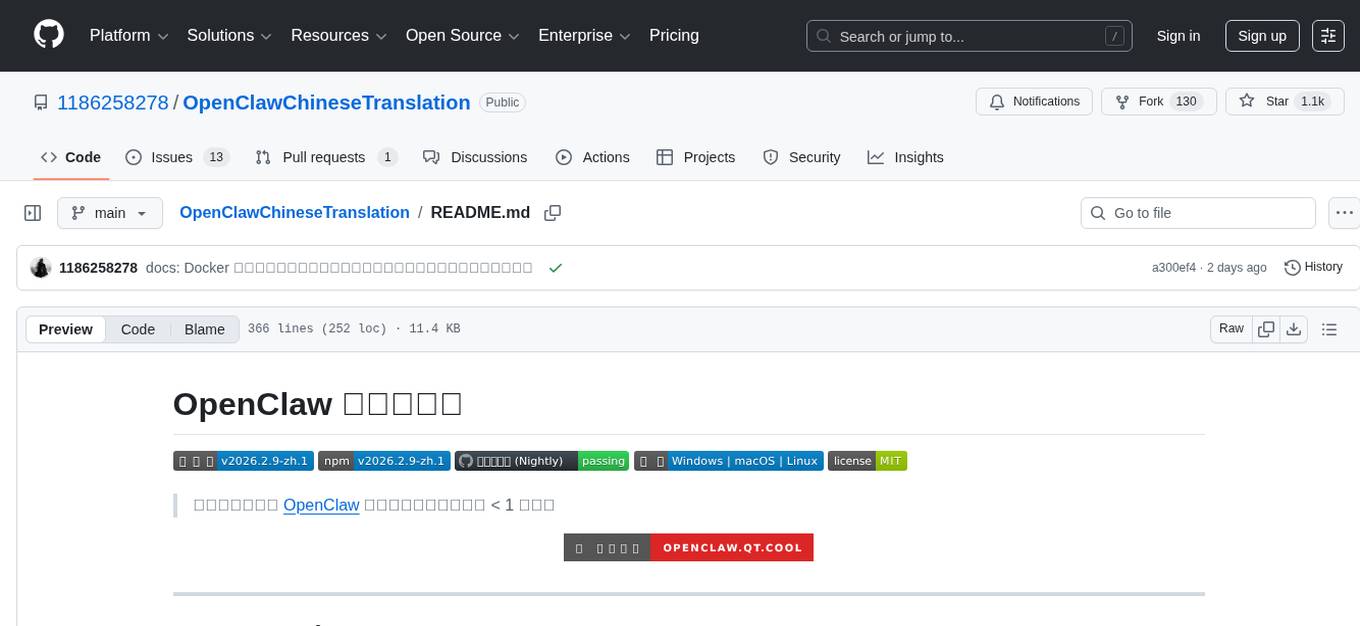
OpenClawChineseTranslation
OpenClaw Chinese Translation is a localization project that provides a fully Chinese interface for the OpenClaw open-source personal AI assistant platform. It allows users to interact with their AI assistant through chat applications like WhatsApp, Telegram, and Discord to manage daily tasks such as emails, calendars, and files. The project includes both CLI command-line and dashboard web interface fully translated into Chinese.
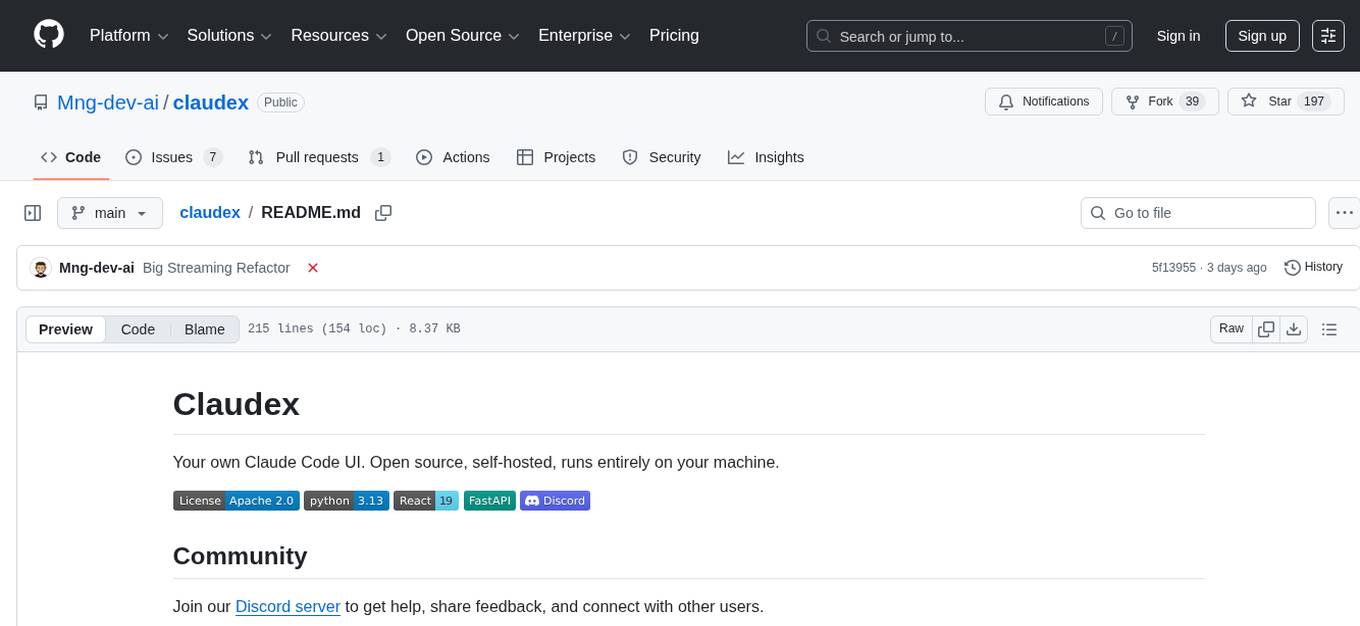
claudex
Claudex is an open-source, self-hosted Claude Code UI that runs entirely on your machine. It provides multiple sandboxes, allows users to use their own plans, offers a full IDE experience with VS Code in the browser, and is extensible with skills, agents, slash commands, and MCP servers. Users can run AI agents in isolated environments, view and interact with a browser via VNC, switch between multiple AI providers, automate tasks with Celery workers, and enjoy various chat features and preview capabilities. Claudex also supports marketplace plugins, secrets management, integrations like Gmail, and custom instructions. The tool is configured through providers and supports various providers like Anthropic, OpenAI, OpenRouter, and Custom. It has a tech stack consisting of React, FastAPI, Python, PostgreSQL, Celery, Redis, and more.
For similar jobs

sweep
Sweep is an AI junior developer that turns bugs and feature requests into code changes. It automatically handles developer experience improvements like adding type hints and improving test coverage.

teams-ai
The Teams AI Library is a software development kit (SDK) that helps developers create bots that can interact with Teams and Microsoft 365 applications. It is built on top of the Bot Framework SDK and simplifies the process of developing bots that interact with Teams' artificial intelligence capabilities. The SDK is available for JavaScript/TypeScript, .NET, and Python.

ai-guide
This guide is dedicated to Large Language Models (LLMs) that you can run on your home computer. It assumes your PC is a lower-end, non-gaming setup.

classifai
Supercharge WordPress Content Workflows and Engagement with Artificial Intelligence. Tap into leading cloud-based services like OpenAI, Microsoft Azure AI, Google Gemini and IBM Watson to augment your WordPress-powered websites. Publish content faster while improving SEO performance and increasing audience engagement. ClassifAI integrates Artificial Intelligence and Machine Learning technologies to lighten your workload and eliminate tedious tasks, giving you more time to create original content that matters.

chatbot-ui
Chatbot UI is an open-source AI chat app that allows users to create and deploy their own AI chatbots. It is easy to use and can be customized to fit any need. Chatbot UI is perfect for businesses, developers, and anyone who wants to create a chatbot.

BricksLLM
BricksLLM is a cloud native AI gateway written in Go. Currently, it provides native support for OpenAI, Anthropic, Azure OpenAI and vLLM. BricksLLM aims to provide enterprise level infrastructure that can power any LLM production use cases. Here are some use cases for BricksLLM: * Set LLM usage limits for users on different pricing tiers * Track LLM usage on a per user and per organization basis * Block or redact requests containing PIIs * Improve LLM reliability with failovers, retries and caching * Distribute API keys with rate limits and cost limits for internal development/production use cases * Distribute API keys with rate limits and cost limits for students

uAgents
uAgents is a Python library developed by Fetch.ai that allows for the creation of autonomous AI agents. These agents can perform various tasks on a schedule or take action on various events. uAgents are easy to create and manage, and they are connected to a fast-growing network of other uAgents. They are also secure, with cryptographically secured messages and wallets.

griptape
Griptape is a modular Python framework for building AI-powered applications that securely connect to your enterprise data and APIs. It offers developers the ability to maintain control and flexibility at every step. Griptape's core components include Structures (Agents, Pipelines, and Workflows), Tasks, Tools, Memory (Conversation Memory, Task Memory, and Meta Memory), Drivers (Prompt and Embedding Drivers, Vector Store Drivers, Image Generation Drivers, Image Query Drivers, SQL Drivers, Web Scraper Drivers, and Conversation Memory Drivers), Engines (Query Engines, Extraction Engines, Summary Engines, Image Generation Engines, and Image Query Engines), and additional components (Rulesets, Loaders, Artifacts, Chunkers, and Tokenizers). Griptape enables developers to create AI-powered applications with ease and efficiency.



